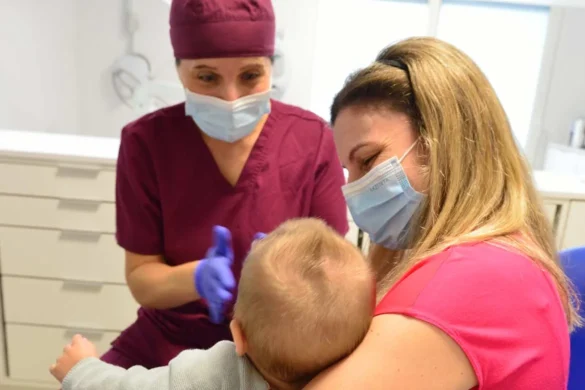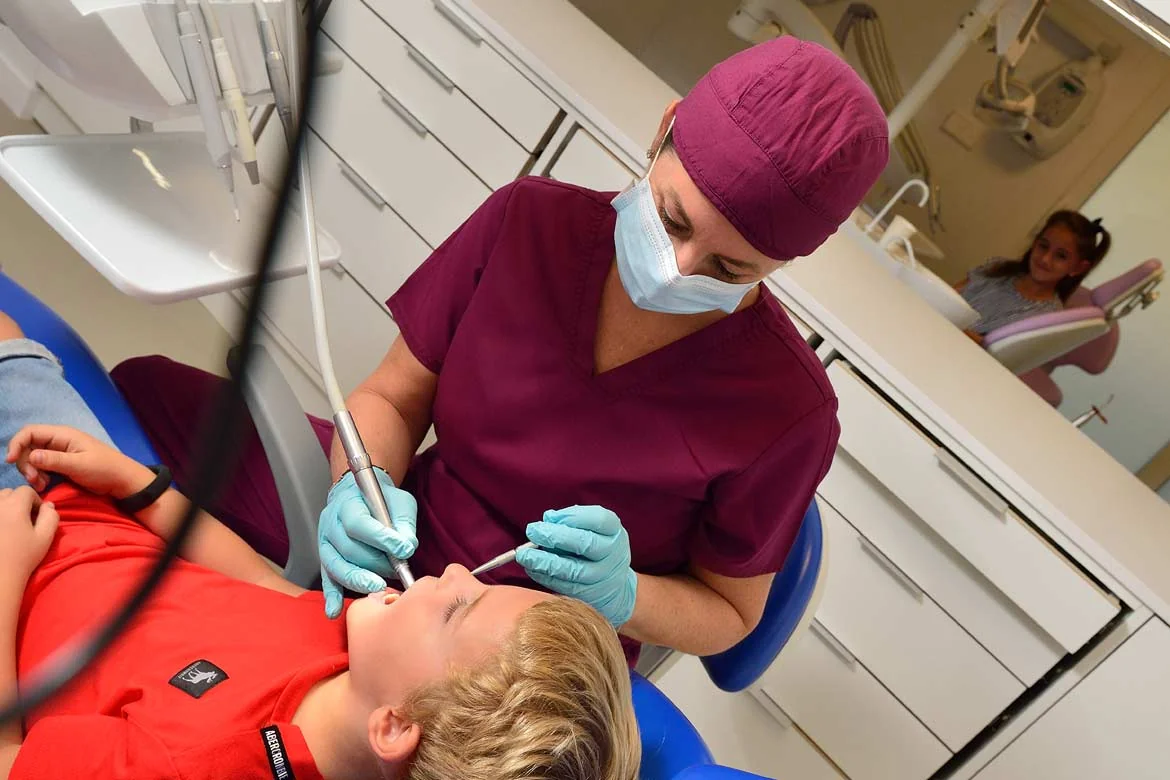Baby Dentistry in Mallorca
Baby dentistry is essential to ensure optimal oral health from the first months of life. As little ones grow, it is crucial to pay attention to their dental needs.
Want to take your baby to the dentist?
Ask us for an appointment with a free check-up and diagnosis.
Whether you want to start treatment or request information, you’re in the right place. Leave us your details and we will contact you within three hours.

When to take your baby to the paediatric dentist?
A baby’s first visit to the dentist should take place around 12 months of age, or when the first tooth erupts. This early appointment is crucial to establish a solid foundation for a baby’s oral health. During this visit, the paediatric dentist will be able to assess your child’s dental development and provide advice on oral hygiene. Early detection of potential problems can prevent long-term complications such as malocclusions or tooth decay. With proper guidance, parents can learn how to properly care for their baby’s gums and teeth, ensuring their baby’s dental wellbeing from the start.
It is important for parents to understand that dental health is not only about the erupting teeth, but also about caring for the gums. Your paediatric dentist can offer recommendations on how to clean your baby’s gums before teeth appear. Starting dental care at an early age also helps little ones feel comfortable in the dentist’s environment, which can be beneficial for future visits.
Dental treatment for your baby in:
Paediatric dentistry is an essential aspect of children’s medical care. The Spanish Society of Paediatric Dentistry emphasises the need to take care of oral health from the first months of life. The prevention of caries and other dental problems is crucial at this stage, as baby teeth play an important role in the development of the jaw and the formation of permanent teeth. Early dental care can contribute to optimal dental health throughout life.
How to take care of your baby’s oral hygiene?
Taking care of your baby’s oral hygiene starts before the first tooth appears. During the first few months, it is advisable to wipe baby’s gums with a damp gauze or soft cloth after each feeding to remove bacteria and keep the mouth clean. Once the first tooth appears, it is essential to start a brushing routine using a soft brush and toothpaste suitable for babies. Brushing should be done at least twice a day, preferably after meals and before bedtime. This not only helps to remove food debris, but also prevents the formation of cavities in baby teeth.
As the child gets older, an age-appropriate toothbrush can be introduced and the correct brushing technique can be taught. The use of fluoride toothpaste can be considered from the age of 2, always following the recommendations of the paediatric dentist. Creating a brushing routine from the beginning is essential to encourage healthy habits in the future.
What foods and habits should be avoided to prevent tooth decay?
To prevent tooth decay in babies, it is important to avoid certain habits and foods. Prolonged use of bottles, especially if they contain sugary liquids, can lead to a condition known as baby bottle tooth decay. This occurs when a baby’s teeth are in frequent contact with sugars that cause demineralisation of tooth enamel. Therefore, it is advisable to limit the use of the bottle and avoid letting the baby sleep with it to prevent damage to baby teeth.
On the other hand, prolonged use of the soother can cause malocclusion problems if it is kept for a long time. It is important for parents to set times and limits for dummy and bottle use. Transitioning to sippy cups is recommended from 12 months of age. In addition, it is essential to limit the intake of sugars and refined carbohydrates, as these can contribute to tooth decay. Including a variety of healthy foods, such as fruits and vegetables, in your baby’s diet not only promotes dental health, but also supports overall growth and development.

Frequently asked questions about baby dentistry
Breastfeeding is an invaluable source of nutrition for babies, but there are some considerations about its relationship to tooth decay. In general, breastfeeding is not directly associated with tooth decay, as long as it is done properly and good oral hygiene is maintained. However, if the baby feeds frequently during the night and does not clean the mouth afterwards, there may be an increased risk of tooth decay. It is essential that parents clean their baby’s gums after each feeding.
Teething is a natural process that occurs when baby teeth begin to erupt through the baby’s gums. This process can begin around 6 months of age, although it can vary from child to child. During teething, babies may experience discomfort, irritability and changes in behaviour. It is common for babies to chew on objects to relieve pressure on their gums. Parents should be aware of these changes and offer safe teething toys to help alleviate discomfort.
Signs of the eruption of the first tooth include swollen gums, increased saliva production and a tendency for the baby to bite down on objects. These symptoms are normal and are part of the dental development process. Parents can help ease their baby’s discomfort by gently massaging the gums or using cool cloths to soothe the swelling.
Relieving the discomfort associated with teething can be a challenge, but there are several strategies parents can use. One of the most effective ways is to offer cool objects to chew on, such as a chilled teething ring or a cold, wet washcloth. The cold can help numb the gums and reduce swelling, providing temporary relief. In addition, gently massaging baby’s gums with a clean finger can also be comforting.
Early childhood tooth decay is a disease that affects baby teeth and can develop rapidly if oral hygiene is not taken care of. Baby bottle tooth decay is a common example of how sugary liquids can demineralise tooth enamel, resulting in tooth decay. It is essential that parents stay informed about the associated risks and take steps to protect their children’s oral health.
Fluoride is essential for strengthening tooth enamel and preventing tooth decay. However, its use should be moderate and supervised by a paediatric dentist, especially in infants and young children. Fluoride works by protecting teeth from demineralisation and helps to remineralise affected areas, making it a key component in the prevention of tooth decay.
The use of fluoride toothpaste is generally recommended from 2 years of age, but always under the guidance and recommendation of a paediatric dentist. It is important to use a minimal amount of paste (the size of a grain of rice) to avoid the risk of fluorosis, which can occur if too much fluoride is ingested. Parents should supervise brushing to ensure that the child does not swallow the toothpaste.






